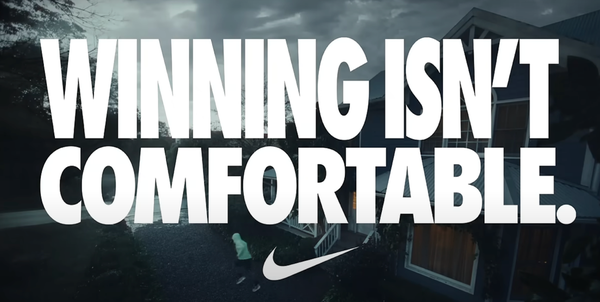
Nike is under fire
for a London Marathon billboard many saw as antisemitic, forcing the brand into damage-control mode as it grapples with a broader turnaround.
The ad, in stark
black lettering on a red background, read: “NEVER AGAIN. UNTIL NEXT YEAR.” While intended as cheeky runner banter -- a nod to how marathoners swear off future races only to rejoin the
starting line -- critics said the phrase’s Holocaust associations, paired with the aggressive color scheme, made it appear tone-deaf.
Investor Bill
Ackman, who has become increasingly vocal about antisemitism in the wake of the Oct. 7 Hamas attacks, was among the loudest voices condemning the ad. “The idea that @Nike would make light of the
Holocaust using Hitler-red imagery in a post-October 7th world is stunning,” he posted on X. “Heads need to roll. WTF Nike?”
advertisement
advertisement
Timing made the
gaffe worse: April 24 was Holocaust Remembrance Day, or Yom Hashoah. The company had used the same ad last year -- on a green backdrop -- without controversy.
Later, Ackman, who owns shares in Nike, posted that Elliott Hill, Nike’s CEO, had apologized to him directly. “Nike is in the midst of a turnaround, which makes mistakes
more likely,” Ackman wrote. “He clearly has a lot of work to do.”
Conservative media outlets including Fox News and the New York Post
amplified the story, while plenty of social media critics called for boycotts. Nike was “woke before woke was a thing,” one X user posted. Others described the ad as “morally
bankrupt” and “a new low.”
Nike responded with a statement, shared by Louis Keene, a reporter at the Forward. The ad, the company
said, was part of its larger “Winning Is Uncomfortable” campaign, designed to reflect the mindset of athletes pushing through pain and self-doubt. Other campaign slogans included
“This is bloody tough” and “Remember why you signed up for this.”
“We did not mean any harm,” Nike said.
“‘Never Again. Until Next Year’ was based on a common phrase among runners. We apologize for the offense caused.”
Some observers
defended the company, noting the phrase is widely understood within the running community as a tongue-in-cheek joke, not a political reference.
Still, the
backlash highlights how risky even familiar phrases can become in today’s cultural climate. With antisemitism rising and public scrutiny of major advertisers intensifying, brands face growing
pressure to manage cultural nuance -- especially when using emotionally charged language in unfamiliar contexts.